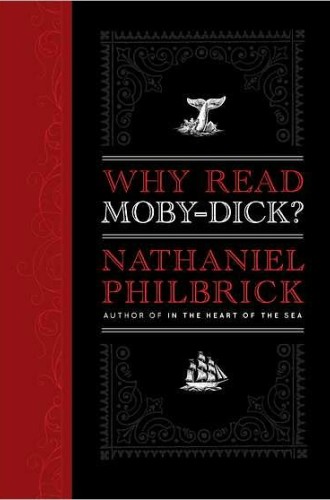Why Read Moby-Dick? by Nathaniel Philbrick
Among all the books written by Americans past and present, one is particularly special to me. I rarely teach it––and when I do, I offer it only to graduate students, and I devote a lot of time to it. The book is elusive, mysterious, passionate and proud, and I have little patience for those who just don’t get it or find it boring. So Moby-Dick quietly rests on my bookshelf, heavily annotated and rarely used.
The title of Nathaniel Philbrick’s slim new meditation on this grand experimental fable asks, Why Read Moby-Dick? It immediately foregrounds the questions at the heart of every assignment made by every English teacher: Why read this book? Or that book? For that matter, why do we assign reading in the first place? In answer, the humanist tradition of liberal arts has long maintained that reading the great works fosters the virtues that make for good human beings.
Read our latest issue or browse back issues.
Philbrick seems to be saying that there is a spiritual quality to the act of reading. Unfortunately, however, he does not delve into the question broached by the title of this little gem of a book, but I believe he would agree that reading Moby-Dick will help us become more mature individuals, more nuanced thinkers and believers and better citizens, if only we take its many challenges head on and study the book with seriousness and devotion.
Philbrick’s main angle of vision, not surprisingly, is historical. He is the author of many books about seafaring, including the award-winning In the Heart of the Sea, which narrates the real-life 1832 catastrophe of the whaler Essex, the tale that inspired Melville’s masterpiece. So what we have here are the highly condensed musings of a scholar who has given his life to the study of such things as the sea, sailors and whaling. Philbrick’s astute gaze makes for thrilling reading, full of brilliant yet understated insights, nuggets of lost data and a few interesting asides about the novel’s relevance for the contemporary United States.
The style of the book is inviting; it’s too bad most English professors are unwilling or unable to write in such an uncluttered voice (and of course some of my colleagues will complain that the book is too belletristic and too untheorized). Almost all of the chapters are extremely short, some only two or three pages in length. This style mimics the book’s subject: Moby-Dick also features many short, topical chapters. Philbrick’s chapters are compelling and quirky too; many of his readings are far enough outside the box to be pleasantly surprising.
For instance, he gives a wonderful rendition of how Melville came to learn of the Essex tragedy. The son of Owen Chase, who was first mate on the Essex and author of the original narrative, loaned Melville his copy of his father’s book. Melville was deliriously delighted to read of the 85-foot sperm whale that crushed the bow of the Essex into kindling. Another excellent, brief chapter describes the Quaker merchants who ran the business of whaling. The pious Bildad, like many of his contemporaries, spoke elegantly of the Gospels but was a hard-hearted and ruthless businessman. Philbrick alludes to Frederick Douglass’s famous observation that the most brutal slaveholders were always the most devout.
Speaking of slavery, Philbrick works hard to show how Moby-Dick, published a decade before the advent of the Civil War, presages that conflict. Perhaps he works too hard at this thesis, since of course he has the advantage of hindsight. But in many ways his remarks are gripping. The 1850s were a turbulent time. The ship of state seemed headed for disaster. But another wonder of Philbrick’s commentary is how, in a very limited space, he describes the Pequod as an industrial machine populated by oppressed workers of different races and ethnicities that nevertheless boasts a harmony at work, illustrating perhaps the kind of democratic spirit by which Melville believed the United States could survive the coming disasters.
Philbrick does not dwell at great length on issues of religion, though his reading shows that Moby-Dick contains a deeply spiritual aspect. These spiritual intimations are most powerfully rendered in the chapter right in the middle of Philbrick’s book, which narrates the short-lived friendship between Nathaniel Hawthorne and Melville. Hawthorne, an older, successful novelist in Melville’s eyes, was also more conservative and more conventionally religious (though he was hardly orthodox). Melville was starstruck. He said to Hawthorne, “Knowing you persuades me more than the Bible of our immortality.” After his encounter with Hawthorne’s story collection Mosses on an Old Manse, he quickly altered his conception of how he should compose Moby-Dick, reimagining his novel in light of the “power of darkness” he perceived in Hawthorne’s fiction. These renditions of the two famous authors are well known to scholars, as this was one of the great literary friendships in American history, but in a book like this the account makes for excellent reading.
It’s also good to read about their reunion in Britain later in life and to hear once more about Melville’s famous hopelessness, his decision “to be annihilated,” and Hawthorne’s brilliant commentary about this episode, written in the privacy of his journals: he wrote that Melville “can neither believe, nor be comfortable in his unbelief; and he is too honest and courageous not to try to do one or the other. If he were a religious man, he would be one of the most truly religious and reverential; he has a very high and noble nature, and better worth immortality than most of us.” This anecdote, which basically ends the book, builds on Philbrick’s subtle conviction that Moby-Dick is, at its core, a metaphysical and epistemological meditation. Hawthorne’s comments frame Moby-Dick in terms that are becoming crucial for the study of Melville’s masterpiece: as a novel debating the pros and cons of ideology, epistemology and the nature of truth; as a work that, like its author, vacillates between belief and unbelief. Moby-Dick illustrates how the search for truth, the yearning for meaning and purpose, was rapidly becoming understood as a dead end, for the culture and for Melville. The tragic tale was thus an ominous revelation a decade before Americans began killing each other at Shiloh, Antietam and Gettysburg in the name of God and country. Belief would never be so easy anymore.
Philbrick suggests that we’re still trying to answer these questions. And perhaps that’s why we should keep reading Moby-Dick. I’ll give Philbrick’s slim volume the best compliment I can think of: it made me want to go back and reread, and then teach, this great novel yet again.






